Artificial Intelligence (AI) software is a computer program that uses machine learning intelligence to analyze human behavior and data patterns. By automating tasks and providing valuable insights, AI software can help businesses streamline their operations and make better decisions. Whether you’re developing an application from scratch or looking to improve existing processes, AI software can provide the intelligence and support you need to succeed.
Table of Contents
What is AI Software?
AI software is a powerful tool that can help businesses gather and analyze data quickly and efficiently. For example, when you make a purchase online, AI software can recognize your needs and preferences, and suggest other products that you might be interested in. This makes online shopping more convenient and efficient.
There are many different types of AI software, each with its own unique capabilities. For example:
- Artificial Intelligence Platforms: These platforms allow you to build applications from scratch, without having to write complex code.
- Chatbots: Chatbots are AI software that can generate messages automatically and carry on a conversation with you.
- Deep Learning Systems: These systems use machine learning algorithms to recognize images, messages, faces, and more.
- Machine Learning Systems: Machine learning systems can interpret data and learn from your regular usage, improving their performance over time.
- Natural Language Processing (NLP) Software: NLP software uses machine learning algorithms to understand and interpret human language. It can be used for tasks such as speech recognition, language translation, and sentiment analysis.
- Robotic Process Automation (RPA) Software: RPA software automates routine, repetitive tasks such as data entry and form filling. It can help businesses save time and reduce errors. An example can be AI-generated invoicing.
- Predictive Analytics Software: Predictive analytics software uses machine learning algorithms to analyze data and make predictions about future trends or events. It can be used for tasks such as forecasting sales or predicting customer behavior.
- Computer Vision Software: Computer vision software uses machine learning algorithms to analyze visual data, such as images or video. It can be used for tasks such as object recognition, facial recognition, and autonomous driving.
By using AI software, businesses can improve their operations, automate tasks, and make better decisions. In the following sections, we’ll take a closer look at some of the top AI software products available today and examine their features, use cases, and pros and cons.
Review of Azure Machine Learning Studio
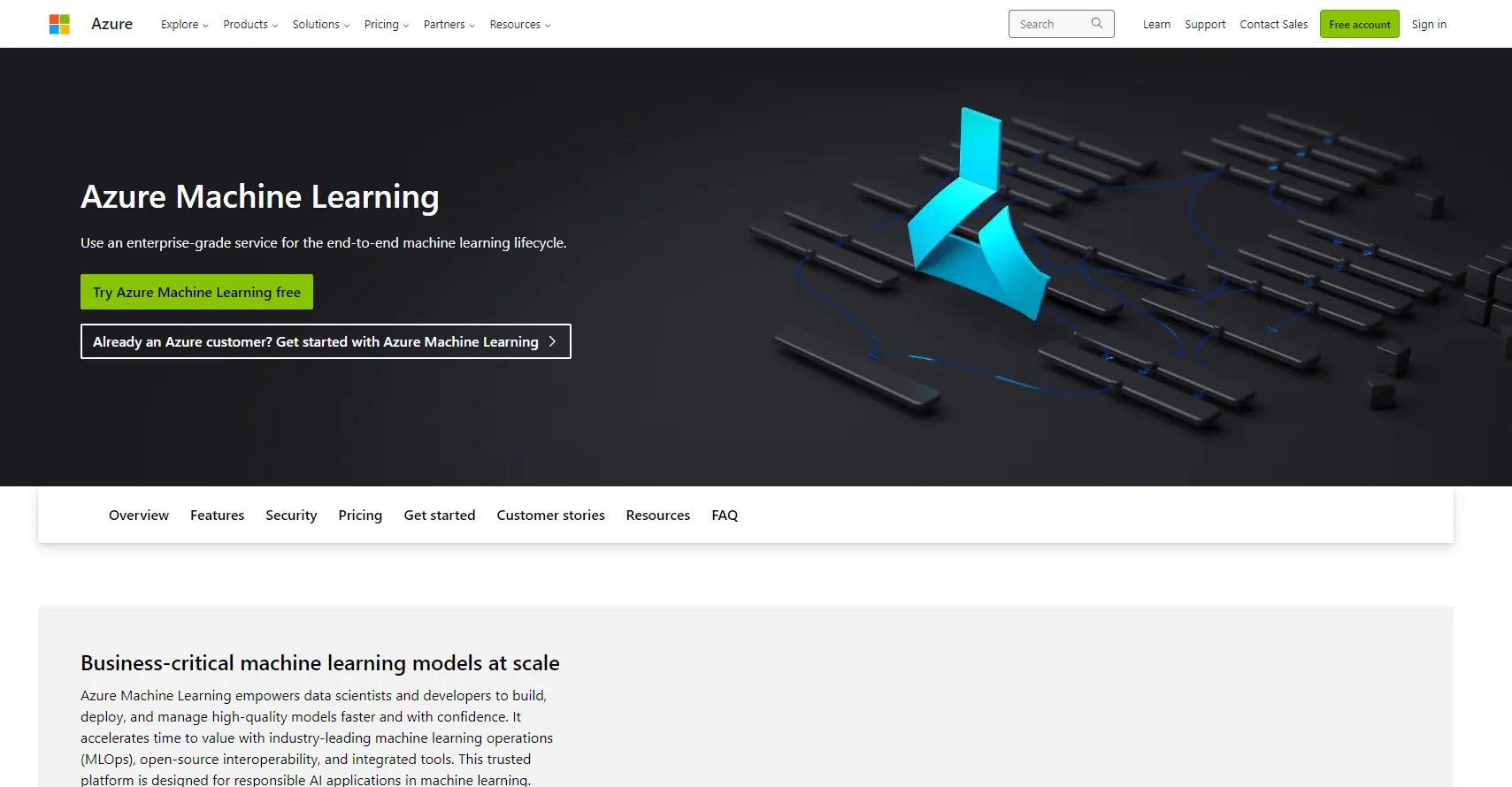
Azure Machine Learning Studio is a powerful cloud-based machine learning platform that enables businesses to build, train, and deploy machine learning models. In this review, we’ll take a closer look at the features, use cases, and pros and cons of this powerful software.
Overview:
Azure Machine Learning Studio is designed to make it easy for businesses to get started with machine learning. It provides a range of tools and features that make it easy to build, train, and deploy machine learning models. With Azure Machine Learning Studio, businesses can create custom models that can help them make better decisions and improve their operations.
Use Cases:
Azure Machine Learning Studio is ideal for businesses in a variety of industries, including finance, healthcare, and manufacturing. It can be used to automate routine tasks, such as data entry and customer support, and to analyze large amounts of data to uncover valuable insights.
Features:
Azure Machine Learning Studio comes with a range of powerful features, including drag-and-drop tools for building machine learning models, a visual interface for training models, and built-in algorithms for common machine learning tasks. It also includes features for automating the deployment and management of machine learning models.
Pros:
- Azure Machine Learning Studio is easy to use, even for those with no prior experience with machine learning.
- It provides a wide range of features and tools for building, training, and deploying machine learning models.
- The platform is highly scalable, making it suitable for businesses of all sizes.
Cons:
- The platform can be expensive, especially for smaller businesses with limited budgets.
- Some users have reported issues with the platform’s performance and reliability.
- It may require some technical expertise to set up and use effectively.
Conclusion:
Overall, Azure Machine Learning Studio is a powerful and versatile machine-learning platform that can help businesses automate tasks and make better decisions. While it may not be suitable for every business, it is certainly worth considering for those looking to improve productivity and streamline operations.
Review of Cloud Machine Learning Engine
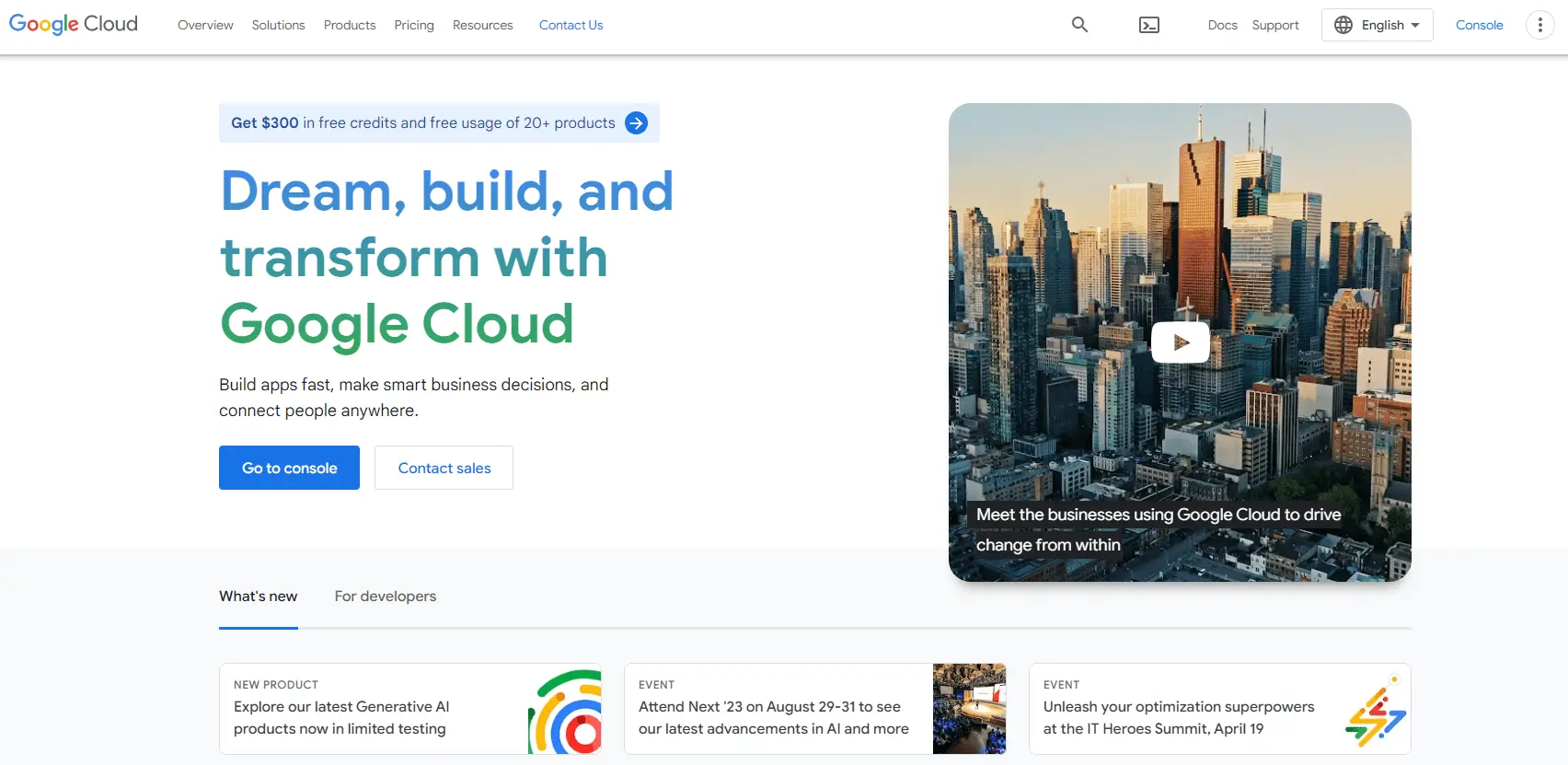
The Cloud Machine Learning Engine is a powerful cloud-based machine learning platform that allows businesses to build and train machine learning models at scale. In this review, we’ll take a closer look at the features, use cases, and pros and cons of this powerful software.
Overview:
The Cloud Machine Learning Engine is designed to make it easy for businesses to get started with machine learning. It provides a range of tools and features that make it easy to build, train, and deploy machine learning models. With the Cloud Machine Learning Engine, businesses can create custom models that can help them make better decisions and improve their operations.
Use Cases:
The Cloud Machine Learning Engine is ideal for businesses in a variety of industries, including finance, healthcare, and retail. It can be used to automate routine tasks, such as data entry and customer support, and to analyze large amounts of data to uncover valuable insights.
Features:
The Cloud Machine Learning Engine comes with a range of powerful features, including pre-built machine learning models, a visual interface for building and training models, and integration with other Google Cloud services. It also includes features for automating the deployment and management of machine learning models.
Pros:
- The Cloud Machine Learning Engine is easy to use, even for those with no prior experience with machine learning.
- It provides a wide range of features and tools for building, training, and deploying machine learning models.
- The platform is highly scalable, making it suitable for businesses of all sizes.
Cons:
- The platform can be expensive, especially for smaller businesses with limited budgets.
- Some users have reported issues with the platform’s performance and reliability.
- It may require some technical expertise to set up and use effectively.
Conclusion:
Overall, the Cloud Machine Learning Engine is a powerful and versatile machine learning platform that can help businesses automate tasks and make better decisions. While it may not be suitable for every business, it is certainly worth considering for those looking to improve productivity and streamline operations.
Review of Sales Force Einstein
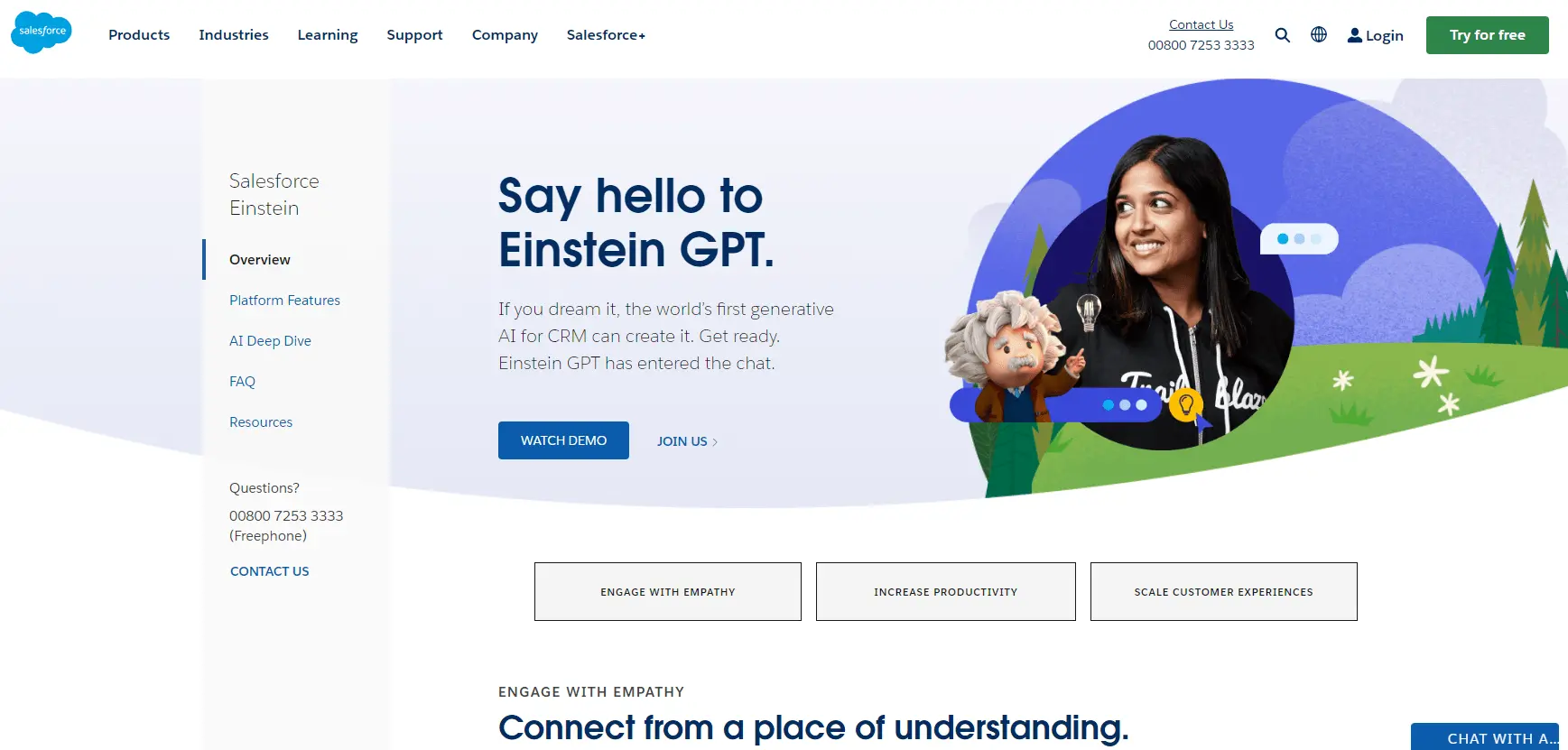
Sales Force Einstein is a powerful artificial intelligence platform that is designed to help businesses improve their sales and marketing operations. In this review, we’ll take a closer look at the features, use cases, and pros and cons of this powerful software.
Overview:
Sales Force Einstein is designed to make it easy for businesses to use artificial intelligence to improve their sales and marketing operations. It provides a range of tools and features that can help businesses automate tasks, analyze data, and make better decisions.
Use Cases:
Sales Force Einstein is ideal for businesses in a variety of industries, including sales, marketing, and customer service. It can be used to automate routine tasks, such as lead generation and customer follow-up, and to analyze large amounts of data to uncover valuable insights.
Features:
Sales Force Einstein comes with a range of powerful features, including natural language processing, predictive analytics, and machine learning algorithms. These features enable businesses to automate tasks, analyze data, and make more informed decisions.
Pros:
- Sales Force Einstein is easy to use and can be customized to meet the specific needs of each business.
- It can help businesses save time and money by automating repetitive tasks and improving the accuracy of their sales and marketing efforts.
- The platform is highly scalable and can be used by businesses of all sizes.
Cons:
- The software can be expensive, especially for smaller businesses with limited budgets.
- It may require some technical expertise to set up and use effectively.
- Some users have reported issues with the accuracy of the platform’s predictions and recommendations.
Conclusion:
Overall, Sales Force Einstein is a powerful and versatile AI platform that can help businesses improve their sales and marketing operations. While it may not be suitable for every business, it is certainly worth considering for those looking to improve productivity and streamline operations.
Review of Nvidia Deep Learning AI
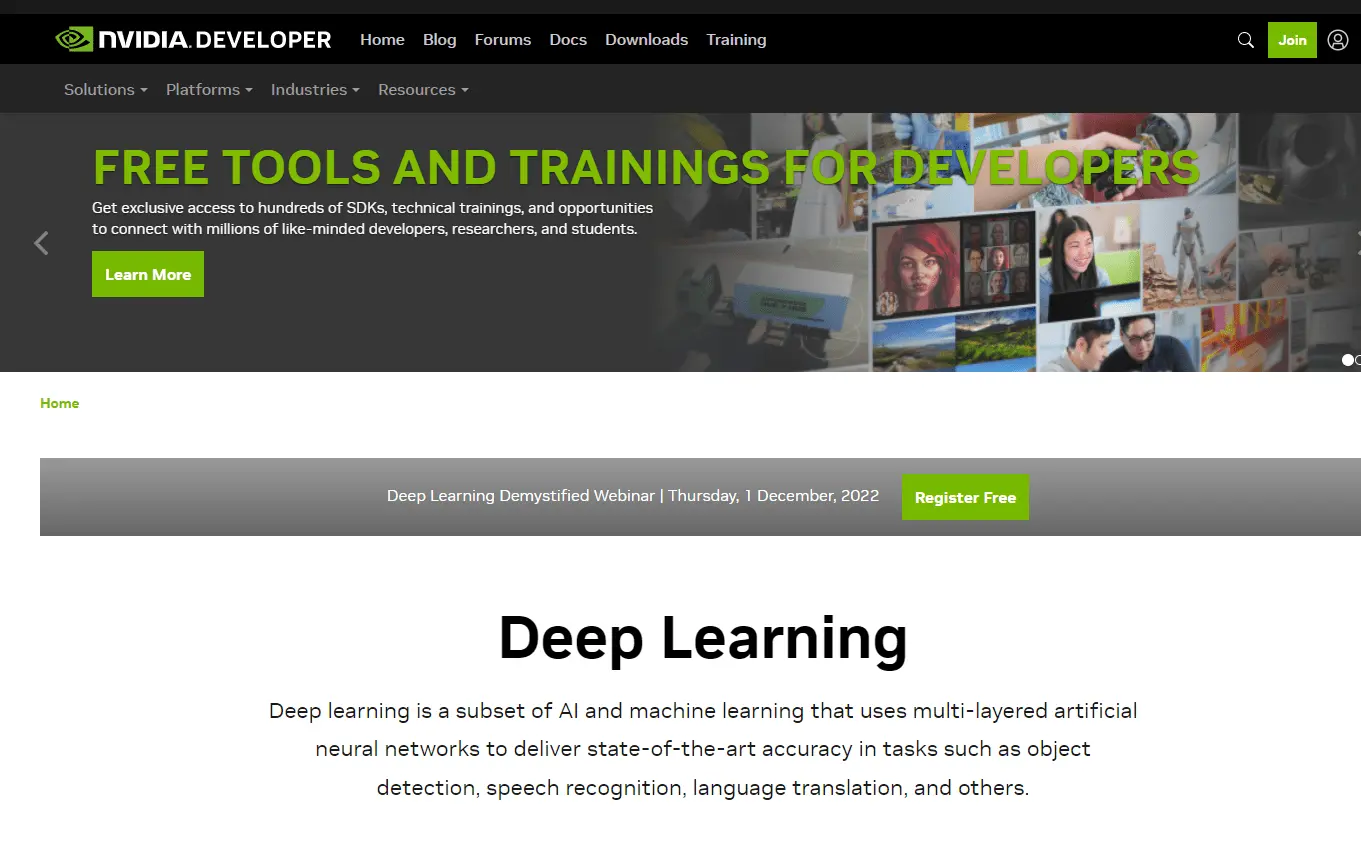
Nvidia Deep Learning AI is a powerful platform that enables businesses to build and train deep learning models. In this review, we’ll take a closer look at the features, use cases, and pros and cons of this powerful software.
Overview:
Nvidia Deep Learning AI is designed to make it easy for businesses to get started with deep learning. It provides a range of tools and features that make it easy to build, train, and deploy deep learning models. With Nvidia Deep Learning AI, businesses can create custom models that can help them make better decisions and improve their operations.
Use Cases:
Nvidia Deep Learning AI is ideal for businesses in a variety of industries, including healthcare, finance, and gaming. It can be used to automate routine tasks, such as image and speech recognition, and to analyze large amounts of data to uncover valuable insights.
Features:
Nvidia Deep Learning AI comes with a range of powerful features, including a scalable infrastructure for building and deploying deep learning models, a wide range of pre-built deep learning algorithms, and a visual interface for managing data and models. It also includes features for automating the deployment and management of deep learning models.
Pros:
- Nvidia Deep Learning AI is highly powerful and can handle complex deep learning tasks with ease.
- It provides a wide range of features and tools for building, training, and deploying deep learning models.
- The platform is highly scalable, making it suitable for businesses of all sizes.
Cons:
- The platform can be expensive, especially for smaller businesses with limited budgets.
- It may require some technical expertise to set up and use effectively.
- The platform may require powerful hardware to run effectively, which can be costly.
Conclusion:
Overall, Nvidia Deep Learning AI is a powerful and versatile deep learning platform that can help businesses automate tasks and make better decisions. While it may not be suitable for every business, it is certainly worth considering for those looking for a powerful and reliable deep-learning solution.
Review of TensorFlow
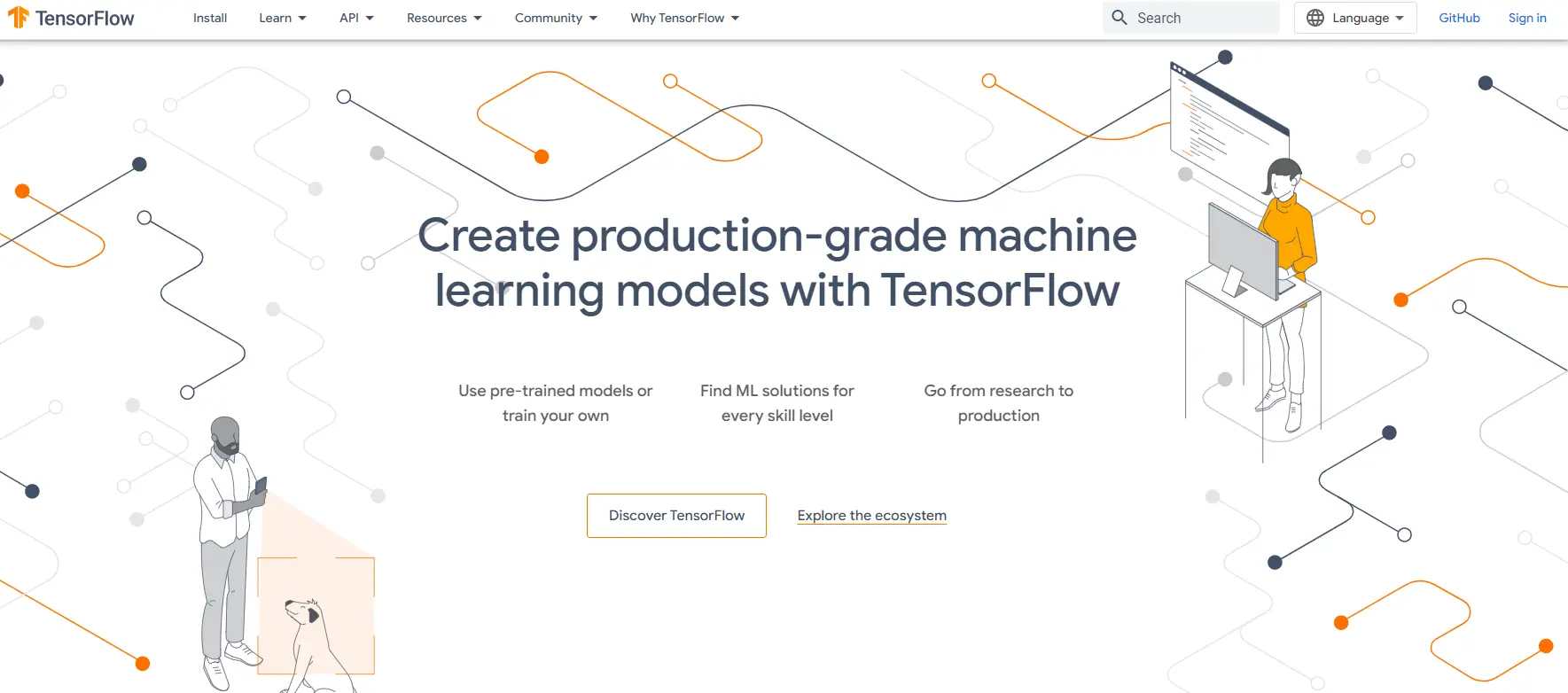
TensorFlow is a powerful open-source machine learning platform that allows businesses to build and deploy machine learning models. In this review, we’ll take a closer look at the features, use cases, and pros and cons of this powerful software.
Overview:
TensorFlow is designed to make it easy for businesses to get started with machine learning. It provides a range of tools and features that make it easy to build, train, and deploy machine learning models. With TensorFlow, businesses can create custom models that can help them make better decisions and improve their operations.
Use Cases:
TensorFlow is ideal for businesses in a variety of industries, including finance, healthcare, and e-commerce. It can be used to automate routine tasks, such as image and speech recognition, and to analyze large amounts of data to uncover valuable insights.
Features:
TensorFlow comes with a range of powerful features, including a scalable infrastructure for building and deploying machine learning models, a wide range of pre-built machine learning algorithms, and a visual interface for managing data and models. It also includes features for automating the deployment and management of machine learning models.
Pros:
- TensorFlow is open-source and free to use, making it accessible to businesses of all sizes.
- It provides a wide range of features and tools for building, training, and deploying machine learning models.
- The platform is highly customizable, making it suitable for businesses with unique needs and requirements.
Cons:
- The platform may require some technical expertise to set up and use effectively.
- It may not be as feature-rich as some of the paid machine learning platforms available.
- The platform may require powerful hardware to run effectively, which can be costly.
Conclusion:
Overall, TensorFlow is a powerful and versatile machine learning platform that can help businesses automate tasks and make better decisions. While it may not be suitable for every business, it is certainly worth considering for those looking for an open-source and customizable machine learning solution.
Review of IBM SPSS
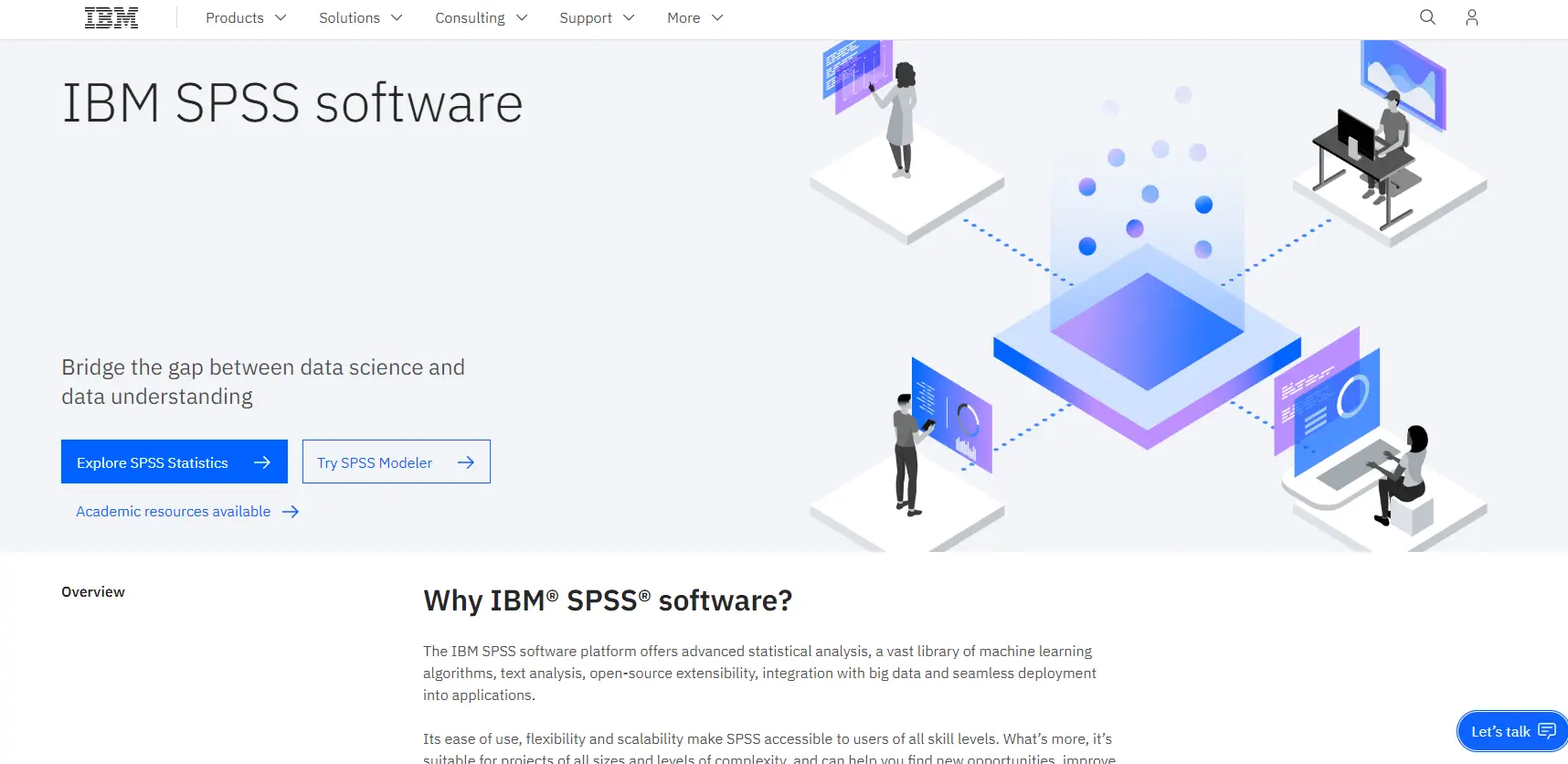
IBM SPSS is a powerful statistical analysis software that allows businesses to analyze and interpret data. In this review, we’ll take a closer look at the features, use cases, and pros and cons of this powerful software.
Overview:
IBM SPSS is designed to make it easy for businesses to analyze and interpret data. It provides a range of tools and features that make it easy to import and manipulate data, conduct statistical analyses, and visualize results. With IBM SPSS, businesses can gain valuable insights into their operations and make data-driven decisions.
Use Cases:
IBM SPSS is ideal for businesses in a variety of industries, including finance, healthcare, and marketing. It can be used to analyze customer behavior, predict market trends, and measure the effectiveness of marketing campaigns.
Features:
IBM SPSS comes with a range of powerful features, including a visual interface for managing data and conducting analyses, a wide range of statistical tests and models, and integration with other IBM software products. It also includes features for automating routine tasks and producing high-quality visualizations of results.
Pros:
- IBM SPSS is highly powerful and can handle complex statistical analyses with ease.
- It provides a wide range of features and tools for analyzing and interpreting data.
- The platform is highly customizable, making it suitable for businesses with unique needs and requirements.
Cons:
- The platform can be expensive, especially for smaller businesses with limited budgets.
- It may require some technical expertise to set up and use effectively.
- The platform may not be as user-friendly as some of the other statistical analysis software available.
Conclusion:
Overall, IBM SPSS is a powerful and versatile statistical analysis software that can help businesses gain valuable insights into their operations. While it may not be suitable for every business, it is certainly worth considering for those looking for a reliable and feature-rich statistical analysis solution.
Review of OpenCV
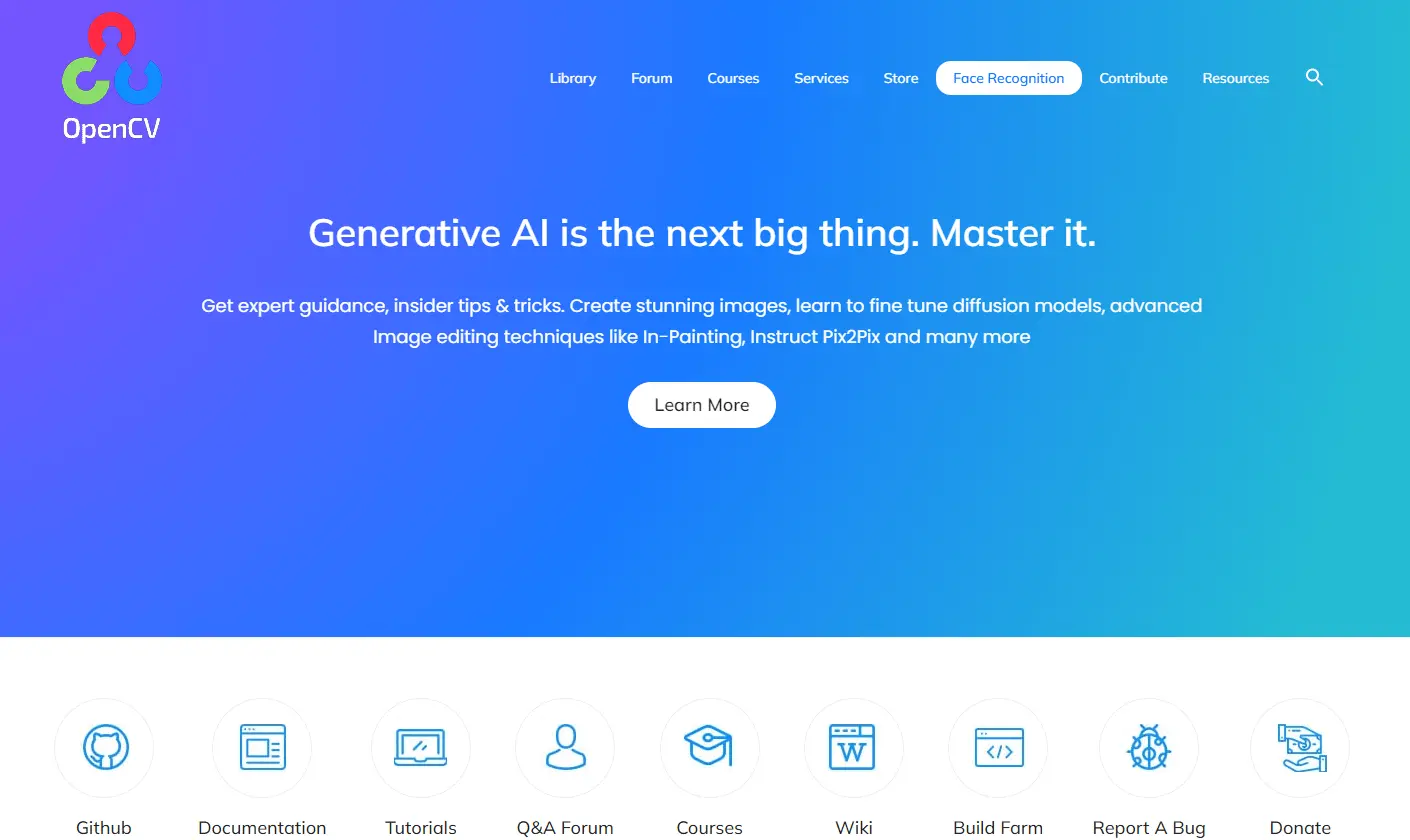
OpenCV is a powerful open-source computer vision library that allows businesses to develop computer vision applications. In this review, we’ll take a closer look at the features, use cases, and pros and cons of this powerful software.
Overview:
OpenCV is designed to make it easy for businesses to develop computer vision applications. It provides a range of tools and features that make it easy to develop computer vision algorithms, process images and videos, and analyze visual data. With OpenCV, businesses can create custom computer vision applications that can help them improve their operations.
Use Cases:
OpenCV is ideal for businesses in a variety of industries, including manufacturing, healthcare, and robotics. It can be used to automate tasks, such as quality control inspections, and to analyze visual data in real-time.
Features:
OpenCV comes with a range of powerful features, including a scalable infrastructure for developing and deploying computer vision applications, a wide range of computer vision algorithms, and a visual interface for managing data and models. It also includes features for automating routine tasks and producing high-quality visualizations of results.
Pros:
- OpenCV is open-source and free to use, making it accessible to businesses of all sizes.
- It provides a wide range of features and tools for developing and deploying computer vision applications.
- The platform is highly customizable, making it suitable for businesses with unique needs and requirements.
Cons:
- The platform may require some technical expertise to set up and use effectively.
- It may not be as user-friendly as some of the other computer vision software available.
- The platform may require powerful hardware to run effectively, which can be costly.
Conclusion:
Overall, OpenCV is a powerful and versatile computer vision library that can help businesses develop and deploy computer vision applications. While it may not be suitable for every business, it is certainly worth considering for those looking for an open-source and customizable computer vision solution.
Review of Keras
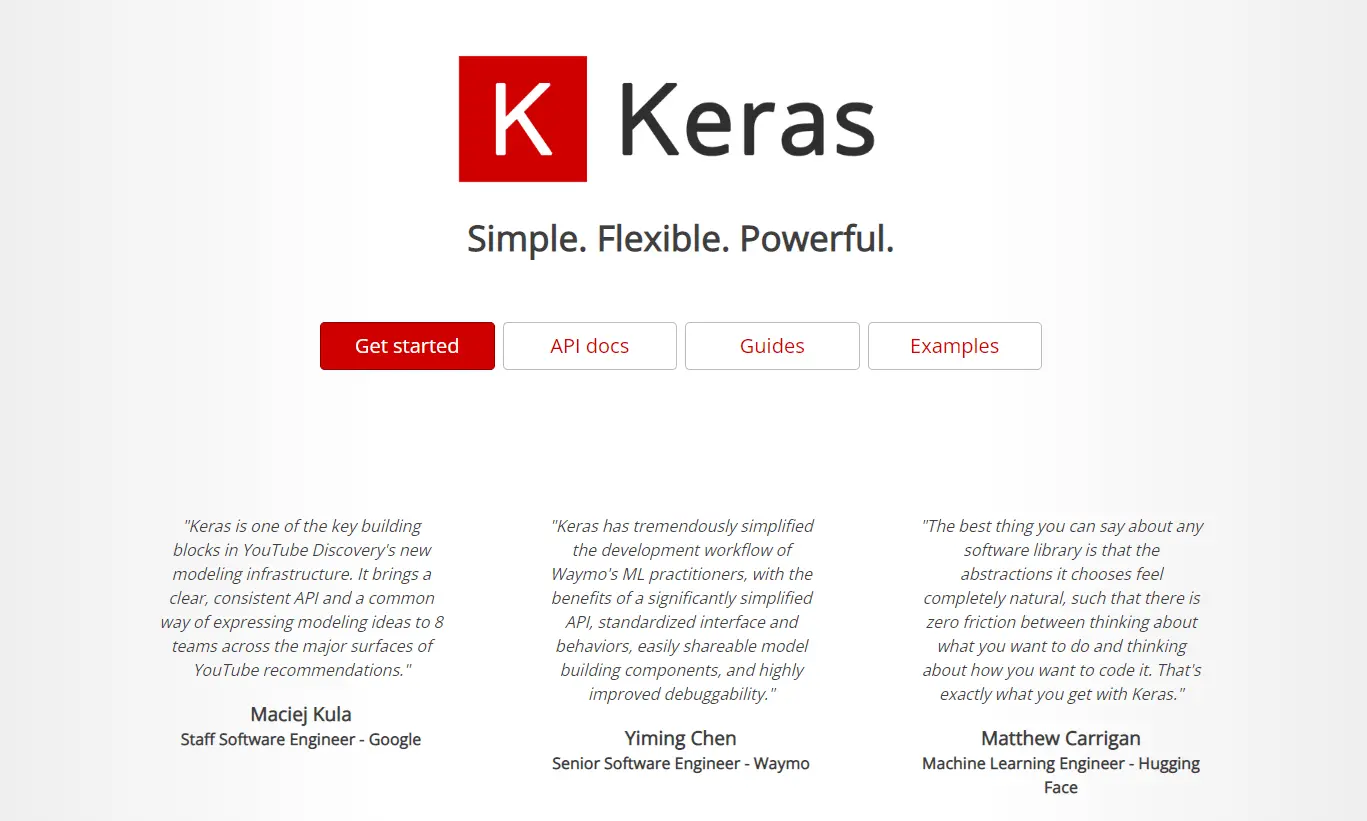
Keras is a powerful open-source deep learning framework that allows businesses to build and deploy neural networks. In this review, we’ll take a closer look at the features, use cases, and pros and cons of this powerful software.
Overview:
Keras is designed to make it easy for businesses to get started with deep learning. It provides a range of tools and features that make it easy to build, train, and deploy deep learning models. With Keras, businesses can create custom models that can help them make better decisions and improve their operations.
Use Cases:
Keras is ideal for businesses in a variety of industries, including finance, healthcare, and e-commerce. It can be used to automate routine tasks, such as image and speech recognition, and to analyze large amounts of data to uncover valuable insights.
Features:
Keras comes with a range of powerful features, including a scalable infrastructure for building and deploying deep learning models, a wide range of pre-built deep learning algorithms, and a visual interface for managing data and models. It also includes features for automating the deployment and management of deep learning models.
Pros:
- Keras is open-source and free to use, making it accessible to businesses of all sizes.
- It provides a wide range of features and tools for building, training, and deploying deep learning models.
- The platform is highly customizable, making it suitable for businesses with unique needs and requirements.
Cons:
- The platform may require some technical expertise to set up and use effectively.
- It may not be as feature-rich as some of the paid deep learning platforms available.
- The platform may require powerful hardware to run effectively, which can be costly.
Conclusion:
Overall, Keras is a powerful and versatile deep learning framework that can help businesses automate tasks and make better decisions. While it may not be suitable for every business, it is certainly worth considering for those looking for an open-source and customizable deep learning solution.
Review of H2O.ai

H2O.ai is a powerful open-source machine learning platform that allows businesses to build and deploy machine learning models. In this review, we’ll take a closer look at the features, use cases, and pros and cons of this powerful software.
Overview:
H2O.ai is designed to make it easy for businesses to get started with machine learning. It provides a range of tools and features that make it easy to build, train, and deploy machine learning models. With H2O.ai, businesses can create custom models that can help them make better decisions and improve their operations.
Use Cases:
H2O.ai is ideal for businesses in a variety of industries, including finance, healthcare, and e-commerce. It can be used to automate routine tasks, such as fraud detection and customer churn prediction, and to analyze large amounts of data to uncover valuable insights.
Features:
H2O.ai comes with a range of powerful features, including a scalable infrastructure for building and deploying machine learning models, a wide range of pre-built machine learning algorithms, and a visual interface for managing data and models. It also includes features for automating the deployment and management of machine learning models.
Pros:
- H2O.ai is open-source and free to use, making it accessible to businesses of all sizes.
- It provides a wide range of features and tools for building, training, and deploying machine learning models.
- The platform is highly customizable, making it suitable for businesses with unique needs and requirements.
Cons:
- The platform may require some technical expertise to set up and use effectively.
- It may not be as user-friendly as some of the other machine learning platforms available.
- The platform may require powerful hardware to run effectively, which can be costly.
Conclusion:
Overall, H2O.ai is a powerful and versatile machine learning platform that can help businesses automate tasks and make better decisions. While it may not be suitable for every business, it is certainly worth considering for those looking for an open-source and customizable machine learning solution.
Review of RapidMiner
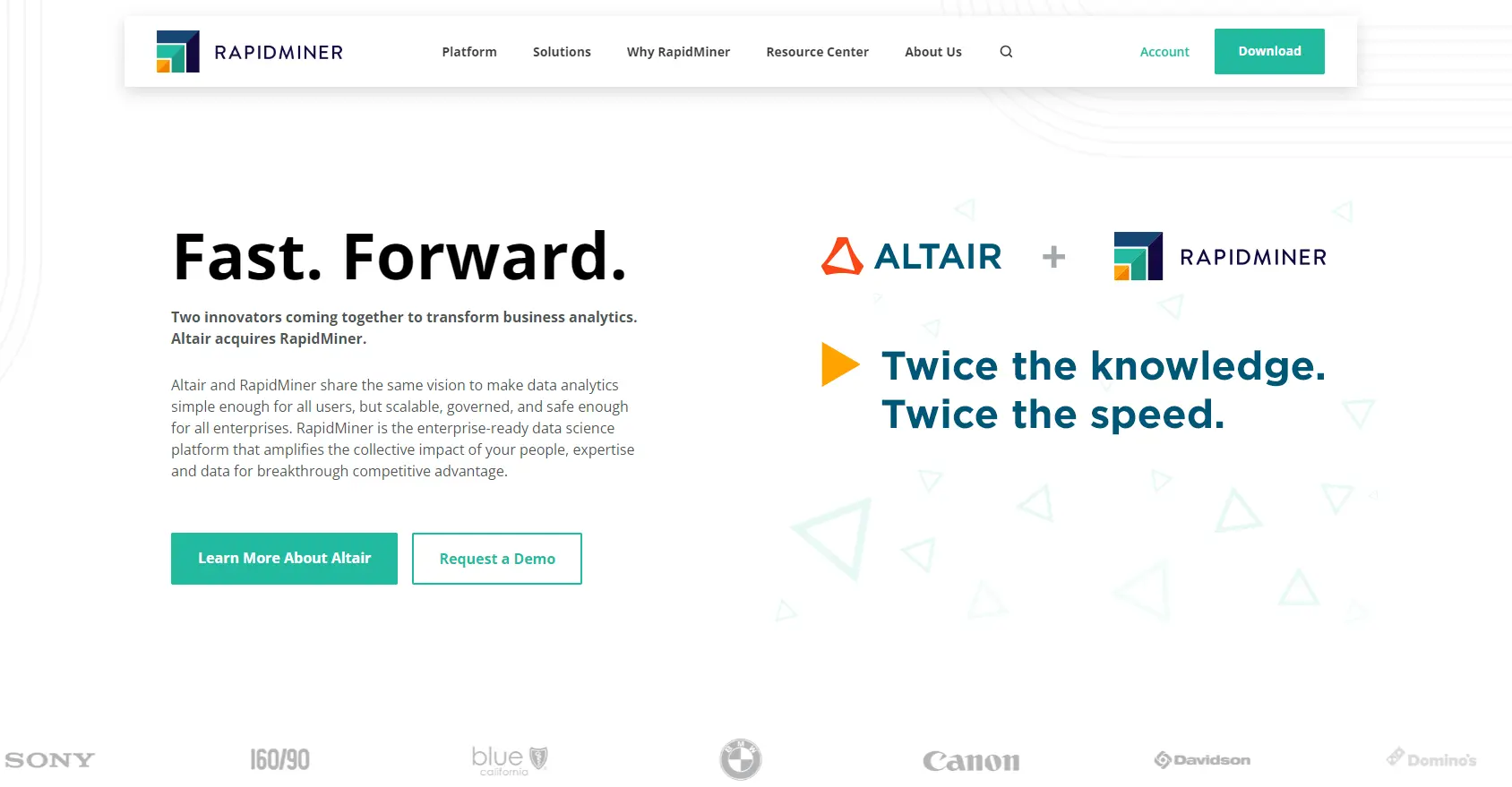
RapidMiner is a powerful open-source data science platform that allows businesses to build and deploy predictive models. In this review, we’ll take a closer look at the features, use cases, and pros and cons of this powerful software.
Overview:
RapidMiner is designed to make it easy for businesses to get started with data science. It provides a range of tools and features that make it easy to import and manipulate data, conduct statistical analyses, and develop predictive models. With RapidMiner, businesses can gain valuable insights into their operations and make data-driven decisions.
Use Cases:
RapidMiner is ideal for businesses in a variety of industries, including finance, healthcare, and marketing. It can be used to analyze customer behavior, predict market trends, and measure the effectiveness of marketing campaigns.
Features:
RapidMiner comes with a range of powerful features, including a visual interface for managing data and models, a wide range of statistical tests and models, and integration with other data science tools and software products. It also includes features for automating routine tasks and producing high-quality visualizations of results.
Pros:
- RapidMiner is open-source and free to use, making it accessible to businesses of all sizes.
- It provides a wide range of features and tools for data science, including data preparation, modeling, and deployment.
- The platform is highly customizable, making it suitable for businesses with unique needs and requirements.
Cons:
- The platform may require some technical expertise to set up and use effectively.
- It may not be as user-friendly as some of the other data science software available.
- The platform may require powerful hardware to run effectively, which can be costly.
Conclusion:
Overall, RapidMiner is a powerful and versatile data science platform that can help businesses gain valuable insights into their operations. While it may not be suitable for every business, it is certainly worth considering for those looking for an open-source and customizable data science solution.
Review of PyTorch
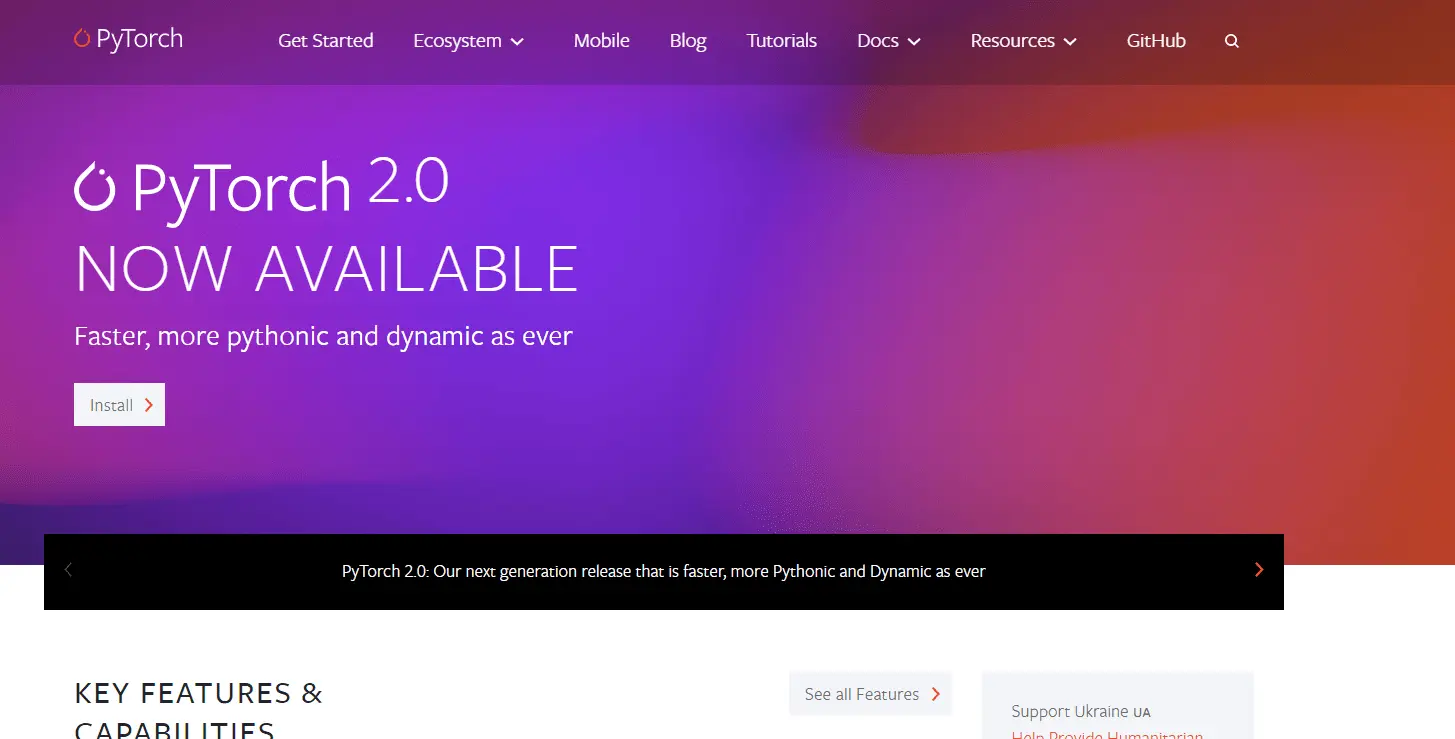
PyTorch is a powerful open-source deep learning framework that allows businesses to build and deploy neural networks. In this review, we’ll take a closer look at the features, use cases, and pros and cons of this powerful software.
Overview:
PyTorch is designed to make it easy for businesses to get started with deep learning. It provides a range of tools and features that make it easy to develop and deploy deep learning models. With PyTorch, businesses can create custom models that can help them make better decisions and improve their operations.
Use Cases:
PyTorch is ideal for businesses in a variety of industries, including finance, healthcare, and e-commerce. It can be used to automate routine tasks, such as image and speech recognition, and to analyze large amounts of data to uncover valuable insights.
Features:
PyTorch comes with a range of powerful features, including a scalable infrastructure for building and deploying deep learning models, a wide range of pre-built deep learning algorithms, and a visual interface for managing data and models. It also includes features for automating the deployment and management of deep learning models.
Pros:
- PyTorch is open-source and free to use, making it accessible to businesses of all sizes.
- It provides a wide range of features and tools for building, training, and deploying deep learning models.
- The platform is highly customizable, making it suitable for businesses with unique needs and requirements.
Cons:
- The platform may require some technical expertise to set up and use effectively.
- It may not be as user-friendly as some of the other deep learning platforms available.
- The platform may require powerful hardware to run effectively, which can be costly.
Conclusion:
Overall, PyTorch is a powerful and versatile deep learning framework that can help businesses automate tasks and make better decisions. While it may not be suitable for every business, it is certainly worth considering for those looking for an open-source and customizable deep learning solution.
Review of KNIME Analytics Platform
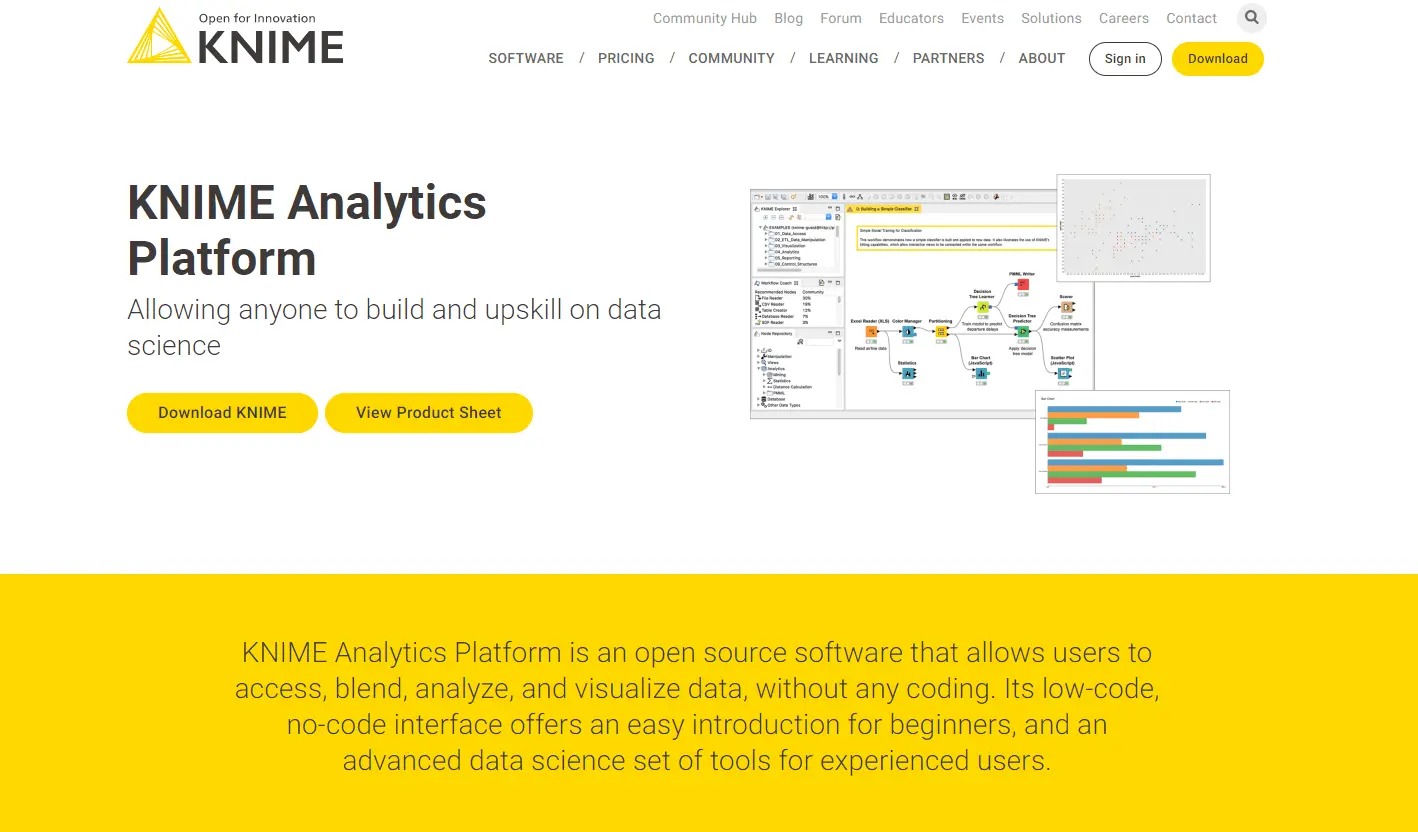
KNIME Analytics Platform is a powerful open-source data analytics platform that allows businesses to build and deploy data-driven workflows. In this review, we’ll take a closer look at the features, use cases, and pros and cons of this powerful software.
Overview:
KNIME Analytics Platform is designed to make it easy for businesses to get started with data analytics. It provides a range of tools and features that make it easy to import and manipulate data, conduct statistical analyses, and develop predictive models. With KNIME Analytics Platform, businesses can gain valuable insights into their operations and make data-driven decisions.
Use Cases:
KNIME Analytics Platform is ideal for businesses in a variety of industries, including finance, healthcare, and marketing. It can be used to analyze customer behavior, predict market trends, and measure the effectiveness of marketing campaigns.
Features:
KNIME Analytics Platform comes with a range of powerful features, including a visual interface for managing data and workflows, a wide range of statistical tests and models, and integration with other data analytics tools and software products. It also includes features for automating routine tasks and producing high-quality visualizations of results.
Pros:
- KNIME Analytics Platform is open-source and free to use, making it accessible to businesses of all sizes.
- It provides a wide range of features and tools for data analytics, including data preparation, modeling, and deployment.
- The platform is highly customizable, making it suitable for businesses with unique needs and requirements.
Cons:
- The platform may require some technical expertise to set up and use effectively.
- It may not be as user-friendly as some of the other data analytics software available.
- The platform may require powerful hardware to run effectively, which can be costly.
Conclusion:
Overall, KNIME Analytics Platform is a powerful and versatile data analytics platform that can help businesses gain valuable insights into their operations. While it may not be suitable for every business, it is certainly worth considering for those looking for an open-source and customizable data analytics solution.
Conclusion:
In this review, we looked at eight of the top AI and data analytics software platforms available today. Each of these platforms offers a range of features and tools that can help businesses automate tasks, gain valuable insights, and make better decisions.
Azure Machine Learning Studio and Cloud Machine Learning Engine are both cloud-based platforms that make it easy to build and deploy machine learning models. Sales Force Einstein is a powerful AI platform designed specifically for sales and marketing applications, while Apache Prediction IO provides a range of powerful machine learning algorithms for predictive analytics.
Nvidia Deep Learning AI and TensorFlow are both powerful open-source deep learning frameworks that allow businesses to build and deploy neural networks. IBM SPSS is a versatile data analytics platform that can be used to analyze large amounts of data and gain valuable insights, while OpenCV provides a range of powerful computer vision tools for image and video processing.
Finally, H2O.ai and RapidMiner are both open-source data analytics platforms that provide a range of tools and features for data preparation, modeling, and deployment.
Overall, each of these platforms has its own strengths and weaknesses, and businesses should carefully evaluate their needs and requirements before selecting a platform. With the right platform, businesses can gain valuable insights, automate routine tasks, and make data-driven decisions that can help them stay ahead of the competition.
Frequently Asked Questions (FAQ) about Top AI and Data Analytics Software Platforms
What is AI software?
AI software is a computer program that uses a machine learning intelligence system to analyze human behavior with the accommodation of various data patterns.
What are the top AI software platforms?
The top AI software platforms include Azure Machine Learning Studio, Cloud Machine Learning Engine, Sales Force Einstein, Apache Prediction IO, Nvidia Deep Learning AI, TensorFlow, IBM SPSS, OpenCV, H2O.ai, and RapidMiner.
What are the use cases for AI software?
AI software can be used in a variety of industries, including finance, healthcare, marketing, and e-commerce. It can be used to automate routine tasks, analyze customer behavior, predict market trends, and measure the effectiveness of marketing campaigns.
What is data analytics software?
Data analytics software is a computer program that allows businesses to analyze large amounts of data and gain valuable insights.
What are the top data analytics software platforms?
The top data analytics software platforms include KNIME Analytics Platform, Azure Machine Learning Studio, IBM SPSS, RapidMiner, and H2O.ai.
What are the use cases for data analytics software?
Data analytics software can be used in a variety of industries, including finance, healthcare, and marketing. It can be used to analyze customer behavior, predict market trends, and measure the effectiveness of marketing campaigns.
Are these platforms free to use?
Some of these platforms, such as KNIME Analytics Platform and RapidMiner, are open-source and free to use. Others, such as Azure Machine Learning Studio and Sales Force Einstein, require a subscription or payment plan.
Do these platforms require technical expertise to use?
Some of these platforms may require technical expertise to set up and use effectively. However, many of them provide a visual interface and a range of pre-built models and algorithms that make it easy for businesses to get started with data analytics and AI.
What are the pros and cons of using these platforms?
The pros of using these platforms include gaining valuable insights, automating routine tasks, and making data-driven decisions. The cons may include the need for technical expertise, the cost of some platforms, and the need for powerful hardware to run some platforms effectively.
Which platform is best for my business?
The best platform for your business will depend on your specific needs and requirements. We recommend carefully evaluating each platform’s features, use cases, pros, and cons before selecting a platform.
